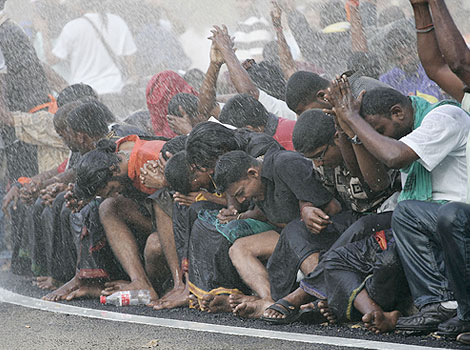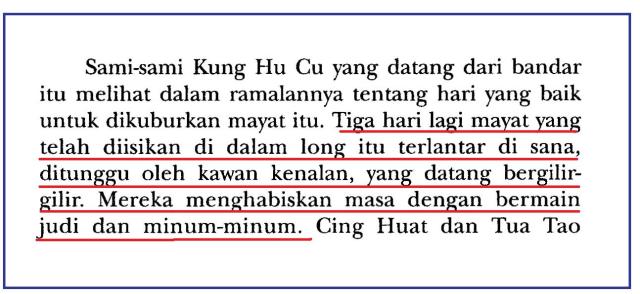
Here’s our prediction. The rally later this morning at KLCC will be an all-Indian affair. Let’s wait and see, shall we?
Now, why is it we don’t think that the Chinese will turn up?
Because they see nothing objectionable about Interlok lah. After all it’s a historical book — even Chua Soi Lek said so.
‘Chinese sell their daughters’ — “It’s true what, so why get upset?” Yes, we’ve actually come across such comments online in response to our Interlok Week postings.
In the World of Interlok, Chinese are cheats. “Kalau lu timbang barang, jangan betul sangat,” (page 367) Cing Huat the sundry shopkeeper teaches his son.
Page 368:
Yew Hock memang ada bakat berniaga, dia patuh kepada ajaran-ajaran bapanya. Menimbang barang selalu kurang, berjual beli selalu bertegang urat lebih dahulu. Satu sen pun dia tidak mahu kurang kalau menjual, kalau membeli dia mencuba seberapa yang dapat dikurangkan.
“It’s a fact what, why make noise to complain” — that’s how some Chinese responded, to justify their disinterest in the Interlok affair, unlike the overly sensitive Indians. how .
Cina baik.
The Cina jahat are like Cing Huat who’s a cutthroat moneylender, and his son Yew Hock learning the ropes from his father.
The Cina baik are Yew Seng (Cing Huat’s younger son) … and a few public personalities beloved by the Malays.
Dia [Yew Seng] tidak suka bapanya dan juga abangnya yang terlalu mementingkan wang, sehingga tidak peduli tentang keadaan di sekelilingnya.
The Cina baik, e.g. Yew Seng in Interlok, actually do not like their own kith and kin. They like the Malays better.
About the Cina jahat who are so engrossed in money that “… sehingga tidak peduli tentang keadaan di sekelilingnya …” Ha-ha-ha-ha-ha-ha-ha-ha-ha-ha — “oblivious to their surroundings” could just as well describe those who do not care that Interlok is now compulsory in the classroom.
The Cina jahat Cing Huat “”tidak pernah kenal orang-orang kampung itu sebegitu jauh, dia kenal mereka hanya kerana urusan wang sahaja”. (Page 422)
In our previous posting, we highlighted how the descriptions of ‘sepet’ and ‘Cina gemuk’, ‘Cina gelojoh’ (greedy) were repeated dozens of times. The Shylock-like traits ascribed to the Chinese are constantly emphasized as well.
Page 472:
Abang mereka Yew Hock hampir serupa sahaja dengan bapanya, tidak mahu tahu tentang keadaan di sekelilingnya, mereka hanya mahu mencari wang …
Now imagine the entire book running in a repetitive loop, and reiterating all the worst negative stereotypes of Chinese. For example, the description of the mercenary Chinese on page 368 (see excerpt above) is a repeat of page 227 (below):
Yew Hock itu … sifat-sifat bapanya juga ada, senantiasa mahu mencari keuntungan. Dia sanggup bertegang urat leher untuk mempertahankan barang yang dijualnya dengan harga yang telah dikatakannya. Betapa pun juga orang menawar, dia tidak akan menurunkan harga barang itu, tetapi apabila membeli barang orang lain dia akan menawar sampai seberapa rendah yang dapat.
Scanned above, Page 217
Even when there is a dead man in a coffin waiting to be buried, his erstwhile friends who come to pay their respects will be avidly drinking and gambling away.
.
$$$
.
Page 42: Tetapi orang Cina lain, tidak boleh sama dengan orang Melayu. Orang Cina berniaga, mereka itu mesti tulis … Siapa yang berhutang, berapa banyak hutangnya.
Page 106: Kerana kebodohan Pak Musa telah bekerja mati-matian sewaktu hidupnya dengan Cina Panjang itu tanpa mendapat sesuatu balasan yang setimpal, dan ketika dia mati anak dan isterinya diusir begitu sahaja. Ini baru satu, tentu masih banyak lagi contoh yang lain.
Page 124: Paman Kok Leng. Dia mengira-ngira dalam kepalanya, berapa keuntungan yang akan diperolehnya.
Page 125: Mereka akan menjadi tauke timah hitam, tauke getah, tauke apa sahaja. Mereka akan menjadi orang kaya.
Page 138: Cing Huat hanya ingin satu saja. Dia ingin melihat pokok berbuahkan emas, berbuahkan duit.
Page 140: “Soal suit tak ada musuh, musuh ialah orang-orang yang mahu menghalang kita cari makan.”
Page 155: Dia, orang yang sudah ada pengalaman, ada duit dan duitnya itu beranak dan beranak.
Page 156: Dalam kota besar dan asing serupa ini orang tidak boleh kasihan, kalau kasihan kita tidak boleh kaya. Di sini wang yang menjadi ukuran. Dalam dunia ini wang itu Tuhan nombor dua.
Page 160: Aku mahu can wang …
Page 161: Asal dapat wang kerja apa pun boleh.
Page 177: Dia hanya fikirkan bagaimana dia dapat mencari wang dan menjadi kaya lekas.
Page 198: … dia sudah mulai sedar bahawa di Rantau Selatan ini, bukan semangat nenek moyang yang dapat menolong, melainkan wang ringgit.
Page 231: Kekayaan mesti ditambah, seperti dia menambah kekayaan yang ditinggalkan oleh bapanya dahulu.
.
No need protest, just vote
.
While the Indians — from NGOs to writers groups to political parties — have been up in arms over the content of the novel, the Chinese selamba aje. None of the Chinese are hopping mad like the Indians.
Or else they say, “Aiyah, no need to protest lah. When election comes around, we show our dissatisfaction through our votes.”
Remember to vote Pakatan! They will (quietly) save you from Umno. They will (silently) defend you from Umno.
The Pakatan leaders will speak up (loudly) for you!! Urm, perhaps not on ‘Interlok’. But maybe on some other issue they might, yah?
.
.
.
.
.
…
..
.
- Interlok: Everybody should just read the damn book!
- Interlok: Chinese sell their daughters
- Interlok: Chinese immigrants came here to carry shit buckets
- Interlok: Sepet, greedy Cina gemuk & liberal dummkopfs
- Interlok: Could Ridhuan Tee be right after all?
- Interlok: Ya lor, DAP pun nampak pada Melayu saja
- Interlok: Cunning Chinese swindles Malay, evicts him like a mangy dog
- Interlok: Podah Chua Soi Lek!
- Interlok: Anwar says it’s a ‘good book’
- Interlok: Sex scene, rape scenes, suicide by hanging









No comments:
Post a Comment
Note: Only a member of this blog may post a comment.